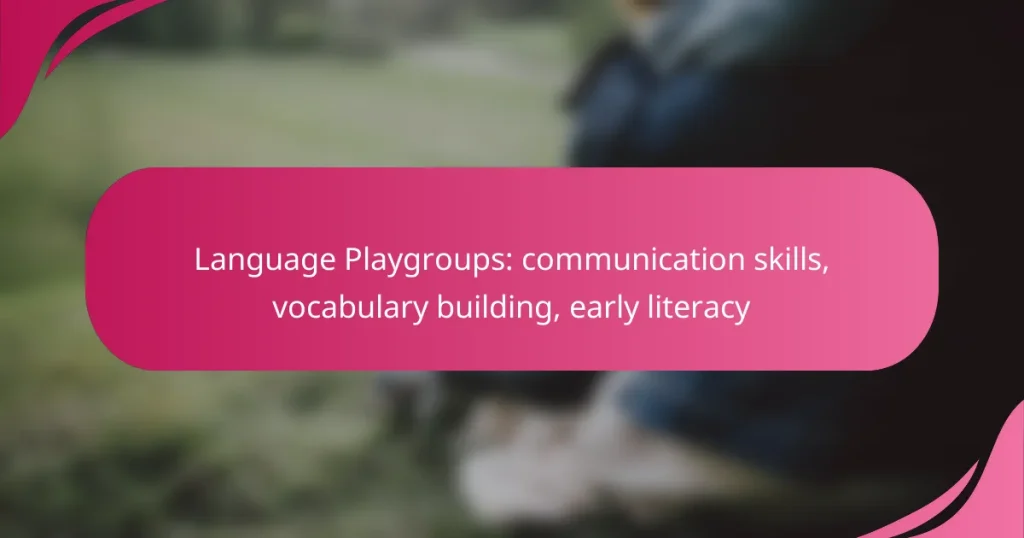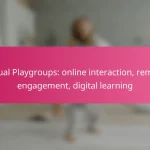Language playgroups are designed to boost children’s communication skills in a fun and interactive setting. By engaging in structured activities, children not only expand their vocabulary but also develop early literacy skills through meaningful social interactions. These playgroups create an enriching environment that fosters learning through play, making language acquisition an enjoyable experience.
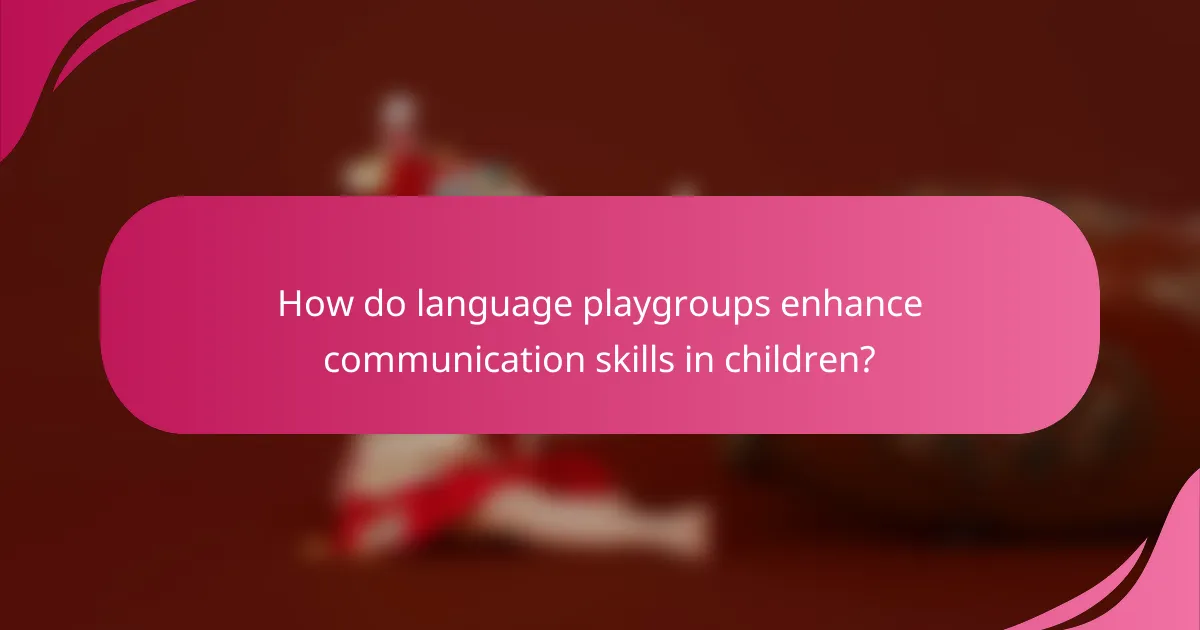
How do language playgroups enhance communication skills in children?
Language playgroups significantly enhance children’s communication skills by providing a structured environment where they can practice speaking, listening, and interacting with peers. These settings encourage the development of vocabulary and early literacy through engaging activities that promote language use.
Interactive storytelling
Interactive storytelling is a key component of language playgroups that fosters communication skills. Children participate by listening to stories and then engaging in discussions about the characters and events, which helps them articulate their thoughts and feelings.
During these sessions, facilitators often encourage children to ask questions and make predictions, enhancing their comprehension and vocabulary. For example, asking “What do you think will happen next?” prompts children to think critically and express their ideas verbally.
Peer-to-peer conversations
Peer-to-peer conversations in language playgroups allow children to practice their communication skills in a natural setting. These interactions help them learn to take turns speaking, actively listen, and respond appropriately, which are essential components of effective communication.
Facilitators can guide these conversations by introducing topics or themes, but children are encouraged to lead discussions themselves. This autonomy helps build confidence and fluency in their language use, as they learn to express their opinions and negotiate meanings with their peers.
Role-playing activities
Role-playing activities are another effective way to enhance communication skills in children. By acting out different scenarios, children learn to use language in context, which aids in vocabulary building and understanding social cues.
For instance, a role-playing game where children pretend to be in a restaurant allows them to practice ordering food and interacting with a server. This kind of play not only enriches their vocabulary but also teaches them the nuances of conversational exchanges and polite speech.
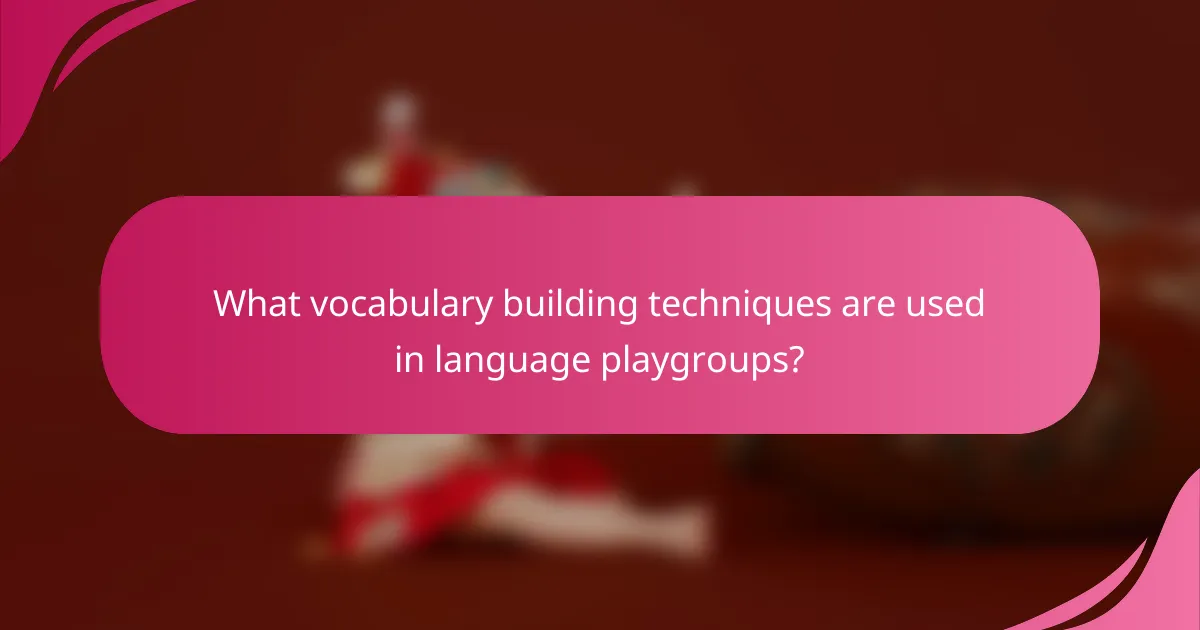
What vocabulary building techniques are used in language playgroups?
Language playgroups utilize various techniques to enhance vocabulary building, focusing on interactive and engaging methods. These techniques help children develop communication skills and expand their word knowledge through playful activities.
Word games
Word games are a fun way to introduce new vocabulary to young children. Activities like “I Spy” or simple word puzzles encourage kids to think creatively and use descriptive language. These games can be tailored to different age groups, making them versatile tools for vocabulary enhancement.
Incorporating word games into playgroup sessions can also foster teamwork and social interaction. Children learn to express themselves and listen to others, which is crucial for effective communication.
Picture books
Picture books serve as an excellent resource for vocabulary building in language playgroups. They combine visual elements with text, helping children associate words with images. This multisensory approach reinforces understanding and retention of new vocabulary.
Selecting diverse picture books that introduce various themes and concepts can keep children engaged. Reading aloud and discussing the illustrations can prompt questions and conversations, further enhancing language skills.
Rhyming activities
Rhyming activities are effective for developing phonemic awareness and vocabulary. Singing songs or reciting nursery rhymes helps children recognize sound patterns and word relationships. This playful approach makes learning enjoyable and memorable.
Incorporating rhyming games, such as creating silly rhymes or matching words, can deepen children’s understanding of language. These activities can be easily adapted to different skill levels, ensuring all children benefit from the experience.
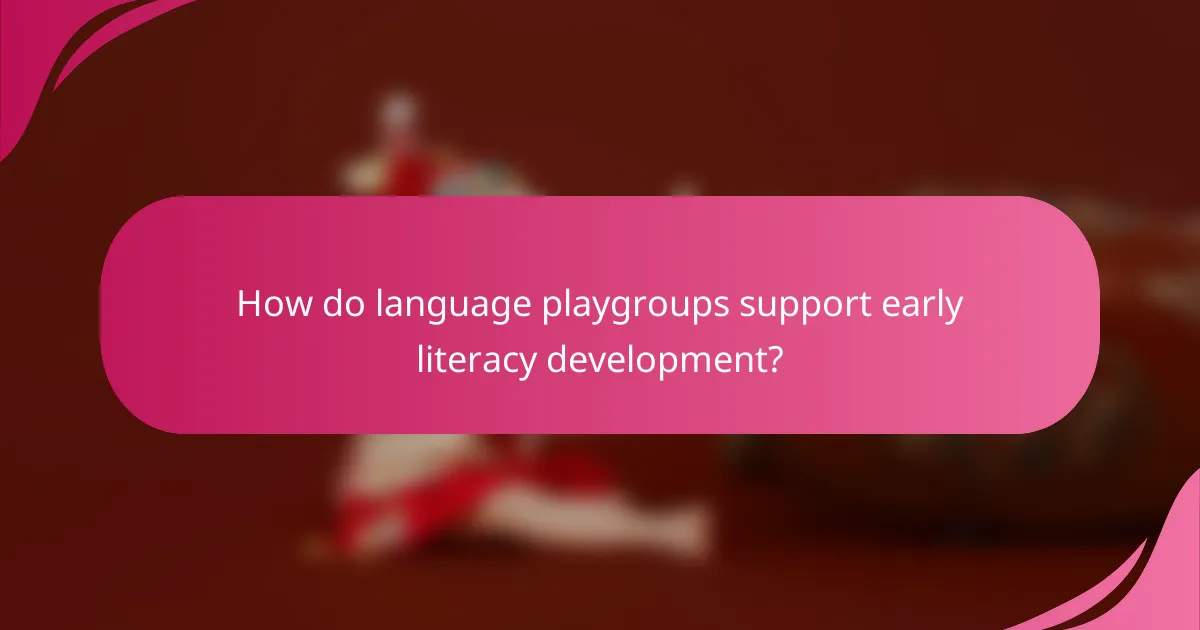
How do language playgroups support early literacy development?
Language playgroups enhance early literacy development by providing interactive environments where children can practice communication skills, expand their vocabulary, and engage in literacy activities. These group settings foster social interaction and create opportunities for children to learn through play.
Phonemic awareness exercises
Phonemic awareness exercises are crucial for helping children recognize and manipulate sounds in words. Activities such as rhyming games, sound matching, and syllable clapping can significantly improve a child’s ability to decode words later on. For instance, using songs or chants that emphasize different sounds can make learning engaging and effective.
Incorporating simple tools like flashcards or phonics apps can further enhance these exercises. Aim for short, focused sessions of about 10-15 minutes to maintain children’s attention and maximize learning.
Reading aloud sessions
Reading aloud sessions are essential for developing listening skills and vocabulary. During these sessions, caregivers or educators can model expressive reading, introduce new words, and encourage children to ask questions about the story. Choose a variety of age-appropriate books that include rich language and diverse themes to keep children engaged.
Consider setting aside regular times for reading, such as daily storytime, to create a routine. Encourage participation by asking children to predict what will happen next or to describe their favorite characters, fostering a deeper connection to the material.
Writing practice
Writing practice in language playgroups helps children develop fine motor skills and understand the connection between spoken and written language. Simple activities like drawing pictures and labeling them or writing letters to family members can make writing fun and meaningful. Use materials like crayons, markers, and various types of paper to encourage creativity.
Introduce writing prompts that relate to their experiences or interests to motivate children. Regular, short writing sessions of about 5-10 minutes can help establish a habit and build confidence in their writing abilities.

What are the benefits of attending language playgroups in urban areas?
Attending language playgroups in urban areas offers numerous advantages for children, including enhanced communication skills, vocabulary development, and early literacy. These groups provide a supportive environment where children can interact with peers and engage in language-rich activities.
Access to diverse language resources
Language playgroups in urban settings often have access to a variety of language resources, such as books, games, and multimedia tools. These resources can significantly enrich a child’s learning experience by exposing them to different vocabulary and language structures.
Parents can also benefit from these resources by learning about effective teaching methods and materials that can be used at home. For example, local libraries or community centers may offer workshops or free access to educational materials that support language development.
Networking with other parents
Joining a language playgroup allows parents to connect with others who share similar interests in their children’s language development. This networking can lead to valuable exchanges of ideas, tips, and experiences that can enhance parenting strategies.
Additionally, parents can form support systems, sharing resources and organizing playdates or group activities that reinforce language skills. This collaborative approach can create a community focused on fostering children’s communication abilities.
Exposure to multilingual environments
Urban language playgroups often reflect the multicultural nature of the city, providing children with exposure to multiple languages. This exposure can enhance cognitive flexibility and help children develop an appreciation for linguistic diversity.
Parents should consider enrolling their children in groups that celebrate various languages, as this can lead to improved language skills and cultural awareness. Engaging with peers who speak different languages can also motivate children to explore new vocabulary and communication styles.
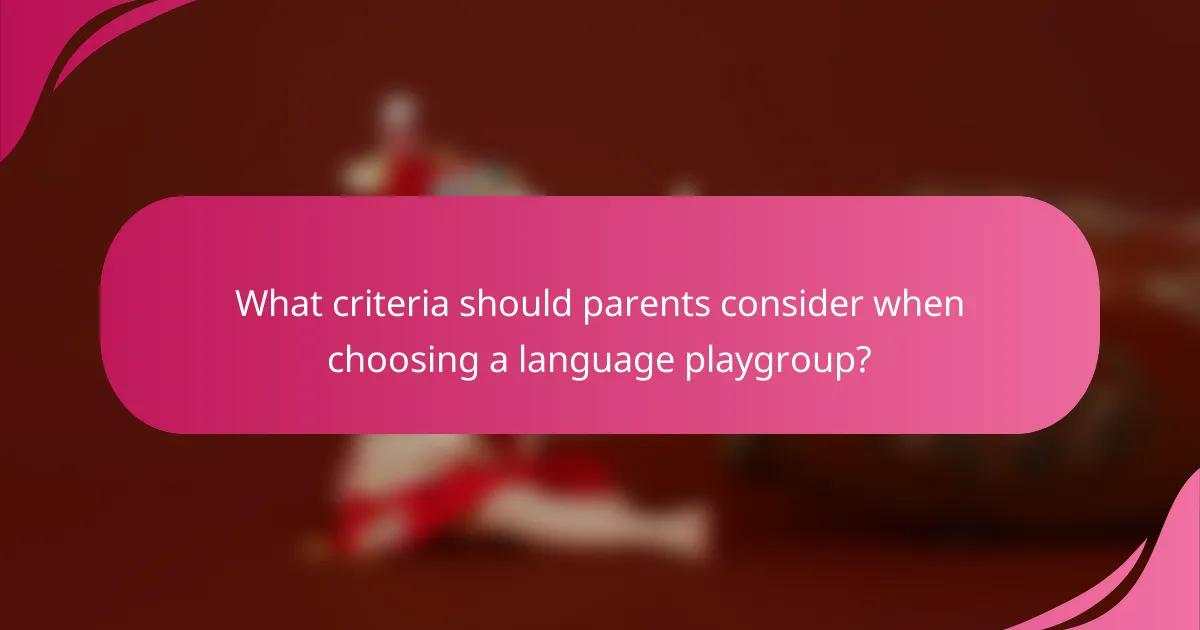
What criteria should parents consider when choosing a language playgroup?
When selecting a language playgroup, parents should prioritize the qualifications of facilitators and the curriculum focus. These factors significantly influence the effectiveness of the program in enhancing communication skills, vocabulary, and early literacy.
Qualified facilitators
Qualified facilitators are essential for a successful language playgroup. Look for individuals with backgrounds in early childhood education, linguistics, or related fields, as they are more likely to employ effective teaching strategies. Additionally, experience in language development can enhance the learning environment.
Consider asking about the facilitator’s training and certifications. Programs that require ongoing professional development often indicate a commitment to high-quality education. Engaging with facilitators who have a passion for language and communication can also create a more stimulating atmosphere for children.
Curriculum focus
The curriculum focus of a language playgroup should align with the developmental needs of young children. Effective programs typically emphasize interactive activities that promote vocabulary building, storytelling, and phonemic awareness. Look for playgroups that incorporate songs, games, and hands-on activities to make learning enjoyable.
It’s beneficial to review the curriculum structure and objectives. A well-rounded program might include themes that change weekly or monthly, allowing children to explore different topics in depth. Parents should also consider how the curriculum adapts to various learning styles and encourages participation from all children.
